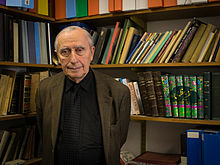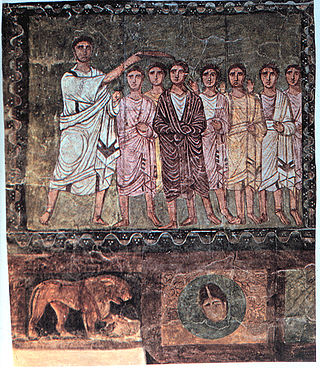
In Abrahamic religions, a messiah or messias is a saviour or liberator of a group of people. The concepts of mashiach, messianism, and of a Messianic Age originated in Judaism, and in the Hebrew Bible, in which a mashiach is a king or High Priest traditionally anointed with holy anointing oil.
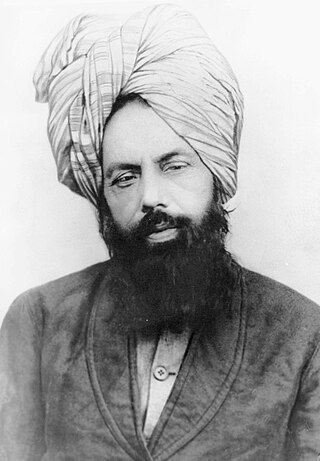
Mirza Ghulam Ahmad was an Indian religious leader and the founder of the Ahmadiyya movement in Islam. He claimed to have been divinely appointed as the promised Messiah and Mahdī—which is the metaphorical second-coming of Jesus (mathīl-iʿIsā), in fulfillment of the Islamic prophecies regarding the end times, as well as the Mujaddid of the 14th Islamic century.

The Naqshbandi order is a Sufi order of Sunni Islam named after Baha al-Din Naqshband. They trace their silsila (chain) to Prophet Muhammad through the first caliph Abu Bakr by the way of Ja'far al-Sadiq. The Naqshbandi Sufi Order is distinguished from other Sunni schools by their adherence to the sharia highlighted by major Naqshbandi scholars including Sirhindi and Dahlawi.

The Lahore Ahmadiyya Movement for the Propagation of Islam, is a separatist group within the Ahmadiyya movement that formed in 1914 as a result of ideological and administrative differences following the demise of Hakim Nur-ud-Din, the first Caliph after Mirza Ghulam Ahmad. Members of the Lahore Ahmadiyya movement are referred to by the majority group as ghayr mubāyi'īn and are also known colloquially as Lahori Ahmadis.
A mujaddid, is an Islamic term for one who brings "renewal" to the religion. According to the popular Muslim tradition, it refers to a person who appears at the turn of every century of the Islamic calendar to revitalize Islam, cleansing it of extraneous elements and restoring it to its pristine purity. In contemporary times, a mujaddid is looked upon as the greatest Muslim of a century.

Ahmad Sirhindi was an Indian Islamic scholar, Hanafi jurist, and member of the Naqshbandī Sufi order who lived during the era of Mughal Empire.

Israel Academy of Sciences and Humanities, based in Jerusalem, was established in 1961 by the State of Israel to foster contact between Israeli scholars in the sciences and humanities and create a think tank for advising the government on research projects of national importance. Its members include many of Israel's most distinguished scholars.
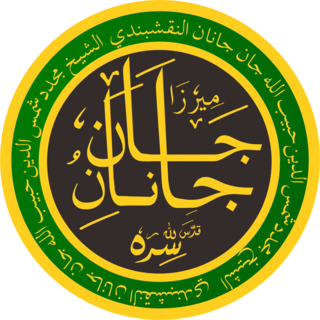
Mirzā Mazhar Jān-i Jānān, also known by his laqab Shamsuddīn Habībullāh (1699–1781), was a renowned Hanafi Maturidi Naqshbandī Sufi poet of Delhi, distinguished as one of the "four pillars of Urdu poetry." He was also known to his contemporaries as the sunnītarāsh, "Sunnicizer", for his absolute, unflinching commitment to and imitation of the Sunnah.

Mirza Basheer-ud-Din Mahmood Ahmad was the second caliph, leader of the worldwide Ahmadiyya Muslim Community and the eldest son of Mirza Ghulam Ahmad from his second wife, Nusrat Jahan Begum. He was elected as the second successor of Mirza Ghulam Ahmad on 14 March 1914 at the age of 25, the day after the death of his predecessor Hakim Nur-ud-Din.

Hakeem Noor-ud-Din was a close companion of Mirza Ghulam Ahmad, the founder of the Ahmadiyya Movement, and his first successor and first Ahmadiyya caliph since 27 May 1908.
Seal of the Prophets, is a title used in the Qur'an and by Muslims to designate the Islamic prophet Muhammad as the last of the prophets sent by God.

Ahmadiyya, officially the Ahmadiyya Muslim Jama'at (AMJ) is an Islamic messianic movement originating in British India in the late 19th century. It was founded by Mirza Ghulam Ahmad (1835–1908), who said he had been divinely appointed as both the Promised Mahdi and Messiah expected by Muslims to appear towards the end times and bring about, by peaceful means, the final triumph of Islam; as well as to embody, in this capacity, the expected eschatological figure of other major religious traditions. Adherents of the Ahmadiyya—a term adopted expressly in reference to Muhammad's alternative name Aḥmad—are known as Ahmadi Muslims or simply Ahmadis.
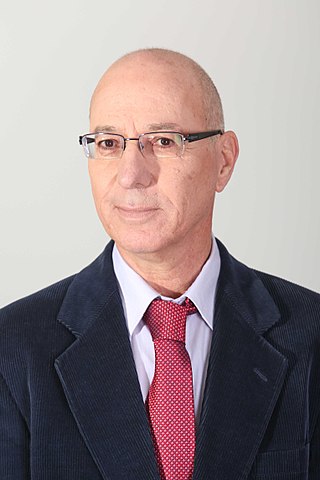
Yitzhak Reiter is an Israeli political scientist. He is a professor specializing in Israel studies and Islamic and Middle East history and politics, teaching at Reichman University and Al-Qasemi College. A senior researcher at the Jerusalem Institute for Policy Research, he formerly chaired the Department of Israel Studies at Ashkelon Academic College.
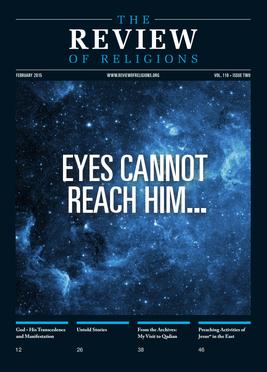
The Review of Religions is an English-language comparative religious magazine published monthly by the Ahmadiyya Muslim Community. Regularly in print since 1902, it is one of the longest running Islamic periodicals in English. It has been described as the main publication of the Ahmadiyya movement in the language and as a valuable source material for information on the geographical expansion of Ahmadi activity. The magazine was launched by Mirza Ghulam Ahmad with the aim of conveying an accurate understanding of Islamic teachings across the English-speaking world and dispelling misconceptions held against the faith. The articles, however, typically comprise distinctly Ahmadi perspectives. In addition to the English edition published from London, the magazine currently publishes separate quarterly editions in German, French and Spanish.

Ahmadiyya is an Islamic branch in Indonesia. The earliest history of the community in Indonesia dates back to the early days of the Second Caliph. During the summer of 1925, roughly two decades prior to the Indonesian revolution, a missionary of the Community, Rahmat Ali, stepped on Indonesia's largest island Sumatra. He established the movement with 13 devotees in Tapaktuan, in the province of Aceh. The Community has an influential history in Indonesia's religious development,. However, in the modern times it has faced increasing intolerance from religious establishments in the country and physical hostilities from radical Muslim groups. The Association of Religion Data Archives estimates around 400,000 Ahmadi Muslims, spread over 542 branches across the country.

Guy Gedalyah Stroumsa is an Israeli scholar of religion. He is Martin Buber Professor Emeritus of Comparative Religion at the Hebrew University of Jerusalem and Emeritus Professor of the Study of the Abrahamic Religions at the University of Oxford, where he is an Emeritus Fellow of Lady Margaret Hall. He is a Member of the Israel Academy of Sciences and Humanities.

Ahmadiyya in Israel is a small Ahmadi community in Israel. The community was first established in the region in the 1920s in what was then the British Mandate of Palestine. Israel is the only country in the Middle East where the Ahmadi branch can be openly practiced. As such, Kababir, a neighbourhood on Mount Carmel in Haifa, Israel, acts as the Middle East headquarters of the community. It is unknown how many Israeli Ahmadis there are, but it is estimated there are about 2,200 Ahmadis in Kababir alone.

Pandit Lekh Ram was a 19th-century social reformer, publicist, and writer from Punjab, India. He was the leader of the radical wing within the Arya Samaj, an Indian Hindu reform movement. He was known for his criticism of the caste system, superstitions, and blind faith prevalent in Hindu society. He also advocated for the education and empowerment of women. He is also known particularly for his encounters with Mirza Ghulam Ahmad, the founder of the Ahmadiyya movement, and as a subject of his death prophecy. Lekh Ram's outspoken views and writings made him a controversial figure, and he faced opposition and violence from conservative Hindus and Muslims. His assassination by an unidentified assailant on 6 March 1897 is believed by Ahmadi Muslims to have occurred in accordance with Ahmad's prophecy concerning him.

The Muslim Sunrise is a monthly Islamic magazine published by the Ahmadiyya Muslim Community in the United States of America. Founded in 1921 by Mufti Muhammad Sadiq in Highland Park area of Detroit, Michigan, it is the earliest Muslim publication originating in the United States. It took its name from a saying of the Islamic prophet Muhammad to the effect that in the latter days "the sun shall rise from the west" and serves as a platform for Islamic and interfaith discussion. Its stated purpose is that it "seeks to open discussions on Islam and topics relating to religion in general. It highlights the role of Islam in an ever-changing global society. It provides a platform for public opinion on contemporary issues and presenting their solutions from an Islamic perspective".

Moshe Sharon is an Israeli historian of Islam.
